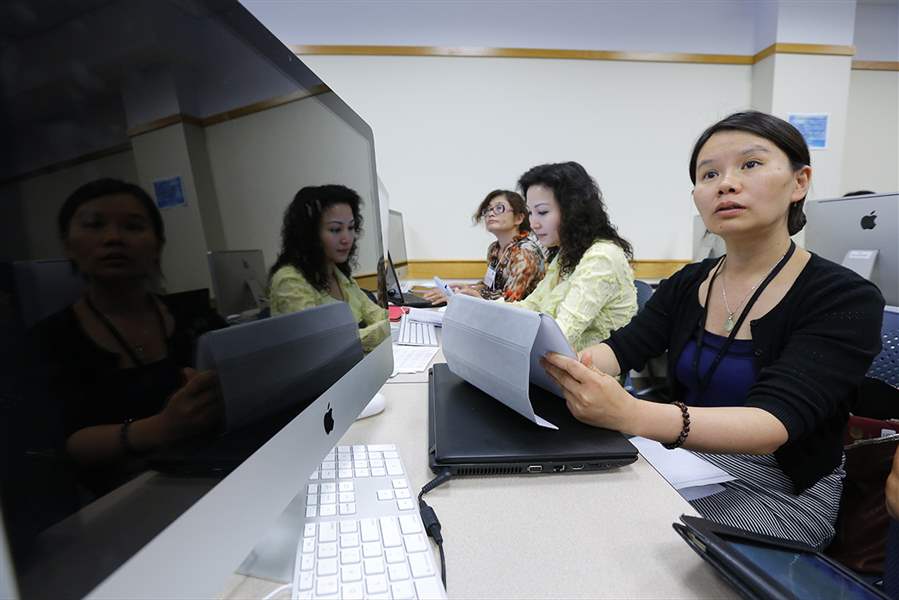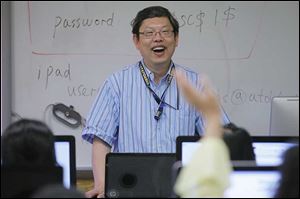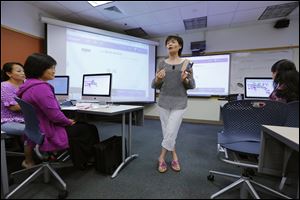
UT hosts Chinese workshop
Educators learn methods to engage language students
7/6/2013
Chinese Center of Toledo teachers Qingjuan King, left, and Helley Zhang and school assistant principal Meng Zhang listen during a national workshop for Chinese teachers at UT.
THE BLADE/ANDY MORRISON
Buy This Image

Chinese Center of Toledo teachers Qingjuan King, left, and Helley Zhang and school assistant principal Meng Zhang listen during a national workshop for Chinese teachers at UT.
The squiggles on the screen translate to “supermarket.”
But what is a supermarket? A room full of teachers scrambled to explain, defining the word in fluent Chinese.
Twenty-five Chinese heritage language teachers from across the United States have gathered at the University of Toledo to participate in the STARTALK-CHELER Chinese Leadership Program.
Concluding today at the Gillham Hall, the eight-day workshop is the first STARTALK program that focuses solely on Chinese heritage language learning, according to STARTALK-CHELER program director An Chung Cheng.
“In heritage schools, we have Chinese-Americans or young immigrants,” said Ms. Cheng, also an associate professor of Spanish at the University of Toledo. “The purpose is to continue the Chinese language beyond the home.”
Participants learned technological teaching methods, curriculum planning, and ways to create a “student-centered” classroom.
Hseuh-Ming “Tommy” Lu, principal of the Chinese School of Delaware and department chair of Computer Information Systems at Delaware Technical Community College, led lectures Thursday and Friday about 11 online learning tools.
In a room cluttered with computers and ringing with Chinese voices, he showed teachers how to use Twiddla, a virtual classroom, and Voice Thread, a program in which teachers and students can prerecord voices and receive online feedback.

Tommy Lu
“Community-based [Chinese heritage] schools only meet once a week,” Mr. Lu said. “We want [teachers] to use these tools to keep the learning activities going [throughout the week].”
Piling Chiu, a certified Chinese teacher at Naperville North and Naperville Central high schools in suburban Chicago, showed program participants how to engage students through hands-on activities like “Information Gap.” After dividing the teachers into groups of four, she made one group define a word on the screen, while other groups timed and recorded responses.
“Instead of just teaching in a lecture method, we’ve learned how to deliver the [Chinese] language to students in different ways — visual, audio, games, and stories,” said Meng Zhang, assistant principal at the Chinese Center of Toledo.
Helley Zhang, a pre-kindergarten teacher at the Chinese Center of Toledo, also admired Ms. Chiu’s demonstration.
“Students have more chances to express themselves,” Ms. Zhang said. “They [would] want to learn; they’re not forced to learn.”
The workshop is funded by a $100,000 grant received in April, 2013, from the National Security Agency and the Central Security Service, which administer STARTALK — a language learning program established in 2006 as part of the National Security Language Initiative.

Piling Chiu, an instructor from suburban Chicago, showed workshop participants how to engage students through hands-on activities.
The initiative encourages the instruction of critical languages not commonly taught in the United States.
According to a 2010 survey conducted by the U.S. Census Bureau, Asians only make up 1.1 percent of Toledo’s population. Jiquan Chen, an ecology professor at the University of Toledo and the former president of the Chinese Association of Greater Toledo, estimated that more than 3,000 Toledoans are Chinese, based on a light survey he conducted in 2007.
In a research project funded by an International Research and Studies grant from the U.S. Department of Education, Ms. Cheng found that there are at least 1,180 community-based Chinese heritage language schools in the United States.
“A lot of kids reject their culture. They’re all Americans; they’re only Chinese by name,” said Liu Hua, a board member for the Chinese Center of Toledo. Chinese heritage schools, she said, “incorporate cultural concepts to build their identity — this way they’ll feel proud.”
The workshop will conclude today at noon, after the program participants present prospective lesson plans. Teachers will have access to a six-month online forum, which will provide continuous support and coaching, Ms. Cheng said.
To find a Chinese heritage school, visit the online directory at cheler.org.
Contact Rosa Nguyen at: rnguyen@theblade.com or 419-724-6050.